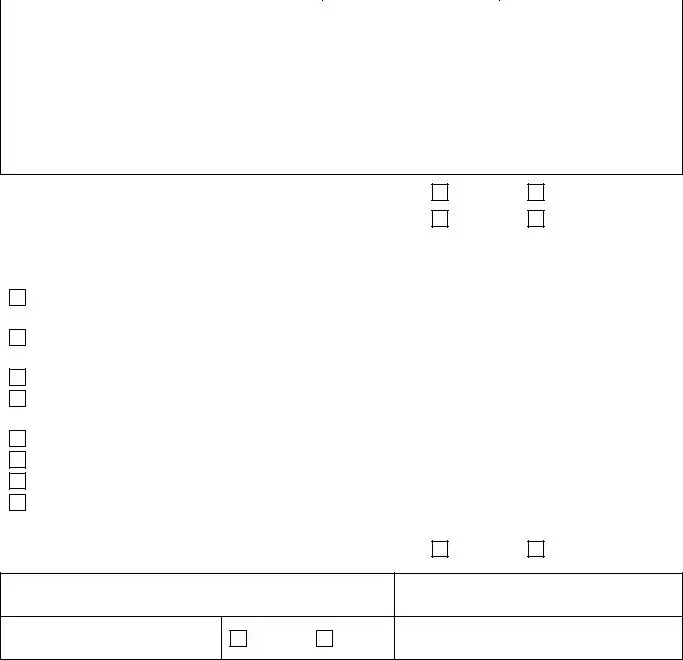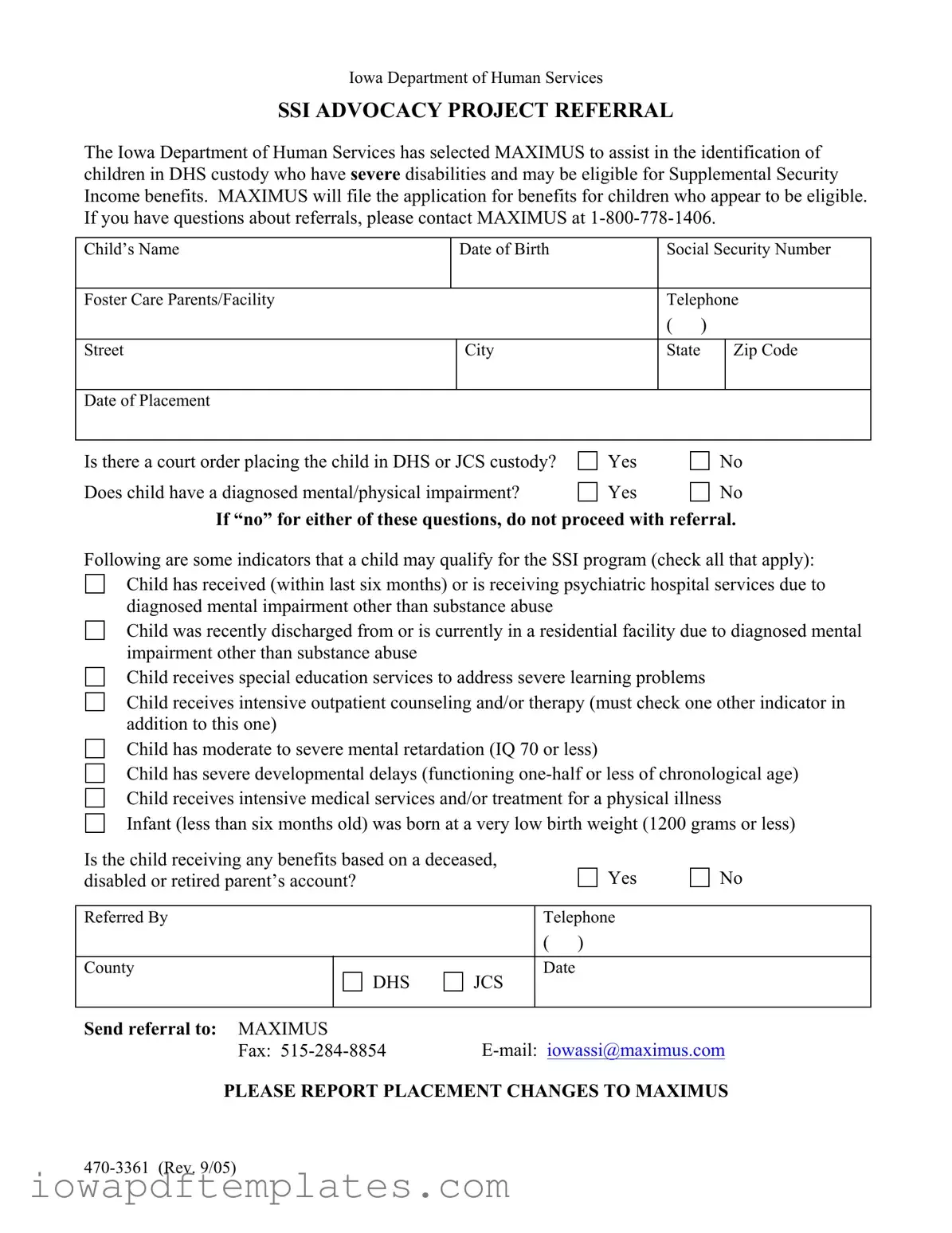Free Iowa 470 3361 Template
Things You Should Know About This Form
What is the Iowa 470 3361 form used for?
The Iowa 470 3361 form is a referral document used by the Iowa Department of Human Services (DHS) to identify children in their custody who have severe disabilities. This form helps determine eligibility for Supplemental Security Income (SSI) benefits. MAXIMUS, the organization assisting with this process, will file the SSI application for eligible children.
Who should fill out the Iowa 470 3361 form?
The form should be filled out by individuals or agencies that are involved with children in DHS custody. This can include foster parents, social workers, or other professionals who have knowledge of the child's situation and disabilities. It is important to ensure that the child meets the necessary criteria before submitting the form.
What information is required on the form?
The form requires several key pieces of information, including:
- Child’s name
- Date of birth
- Social Security number
- Contact information for the foster care parents or facility
- Date of placement in custody
- Details about any court orders related to custody
- Information regarding diagnosed mental or physical impairments
What are the indicators that a child may qualify for SSI?
The form lists several indicators that suggest a child may qualify for SSI benefits, including:
- Recent psychiatric hospital services for mental impairment.
- Current or past residency in a facility for mental impairment.
- Special education services for severe learning problems.
- Intensive outpatient counseling or therapy.
- Moderate to severe mental retardation (IQ 70 or less).
- Severe developmental delays.
- Intensive medical services for a physical illness.
- Infants born at very low birth weight.
What should I do if the child does not meet the criteria?
If the child does not have a diagnosed mental or physical impairment, or if there is no court order placing the child in custody, do not proceed with the referral. It is essential to ensure that all criteria are met before submitting the form.
How can I contact MAXIMUS for questions about the referral?
If you have questions regarding the referral process or need assistance, you can contact MAXIMUS at 1-800-778-1406. They can provide guidance and support related to the SSI Advocacy Project.
What should I do if there are changes in the child's placement?
It is important to report any changes in the child's placement to MAXIMUS. Keeping them informed ensures that the child's information is up to date and can affect their eligibility for benefits. You can contact them via phone or send an email to iowassi@maximus.com.
How is the completed form submitted?
The completed Iowa 470 3361 form can be submitted to MAXIMUS via fax at 515-284-8854 or by email at iowassi@maximus.com. Make sure all required information is filled out accurately to avoid delays in processing.
Form Features
| Fact Name | Description |
|---|---|
| Purpose | The Iowa 470-3361 form is used to refer children in the custody of the Iowa Department of Human Services (DHS) for potential eligibility for Supplemental Security Income (SSI) benefits. |
| Governing Law | This form operates under the provisions of the Social Security Act and related Iowa state regulations concerning children with disabilities. |
| Eligibility Criteria | Children must have a diagnosed mental or physical impairment to be eligible for SSI benefits. A court order placing the child in DHS or JCS custody is also required. |
| Referral Process | MAXIMUS is designated to assist with the identification and application process for children who may qualify for SSI benefits. |
| Contact Information | Questions regarding referrals can be directed to MAXIMUS at 1-800-778-1406. |
| Submission Details | The completed form should be sent to MAXIMUS via fax at 515-284-8854 or via email at iowassi@maximus.com. |
Discover Other PDFs
Iowa 1040c - Nonresidents are encouraged to familiarize themselves with the eligibility requirements for this composite filing process.
In addition to outlining the basic terms of the rental agreement, utilizing resources such as californiapdf.com/editable-residential-lease-agreement can help both landlords and tenants customize their agreements to better fit their specific needs and ensure all necessary details are captured effectively.
Iowa Doc - Disclose any previous incarceration or probation status.
Key takeaways
When filling out and using the Iowa 470 3361 form, there are several important points to keep in mind. Understanding these key takeaways will help ensure a smooth process.
- Eligibility Criteria: Before filling out the form, confirm that the child has a diagnosed mental or physical impairment and is in DHS or JCS custody. If either condition is not met, do not proceed with the referral.
- Complete Information: Provide accurate details about the child, including their name, date of birth, and Social Security number. Missing information may delay the process.
- Indicators of Qualification: Check all relevant indicators that suggest the child may qualify for Supplemental Security Income (SSI). This includes recent psychiatric services, special education needs, or severe developmental delays.
- Contact Information: Ensure that the contact details for the foster care parents or facility are correct. This will facilitate communication if any questions arise.
- Referral Submission: Send the completed form to MAXIMUS via fax or email. Double-check the contact information to avoid any miscommunication.
- Benefit Queries: If you have questions about the referral process or the benefits, do not hesitate to reach out to MAXIMUS at 1-800-778-1406 for assistance.
- Report Changes: It is crucial to report any changes in the child’s placement to MAXIMUS promptly. Keeping them updated will help maintain accurate records and support the child’s application.
By following these guidelines, you can help ensure that the Iowa 470 3361 form is filled out correctly and that the child receives the support they need.
Sample - Iowa 470 3361 Form

Iowa Department of Human Services
SSI ADVOCACY PROJECT REFERRAL
The Iowa Department of Human Services has selected MAXIMUS to assist in the identification of children in DHS custody who have severe disabilities and may be eligible for Supplemental Security Income benefits. MAXIMUS will file the application for benefits for children who appear to be eligible. If you have questions about referrals, please contact MAXIMUS at
Child’s Name |
|
Date of Birth |
Social Security Number |
||
|
|
|
|
|
|
Foster Care Parents/Facility |
|
|
Telephone |
||
|
|
|
( |
) |
|
|
|
|
|
|
|
Street |
|
City |
State |
|
Zip Code |
|
|
|
|
|
|
Date of Placement
Is there a court order placing the child in DHS or JCS custody?
Does child have a diagnosed mental/physical impairment?
Yes
Yes
No
No
If “no” for either of these questions, do not proceed with referral.
Following are some indicators that a child may qualify for the SSI program (check all that apply):
Child has received (within last six months) or is receiving psychiatric hospital services due to diagnosed mental impairment other than substance abuse
Child was recently discharged from or is currently in a residential facility due to diagnosed mental impairment other than substance abuse
Child receives special education services to address severe learning problems
Child receives intensive outpatient counseling and/or therapy (must check one other indicator in addition to this one)
Child has moderate to severe mental retardation (IQ 70 or less)
Child has severe developmental delays (functioning
Child receives intensive medical services and/or treatment for a physical illness
Infant (less than six months old) was born at a very low birth weight (1200 grams or less)
Is the child receiving any benefits based on a deceased, disabled or retired parent’s account?
Yes
No
Referred By
County
Telephone
( )
Date
DHS |
JCS |
Send referral to: MAXIMUS
Fax:
PLEASE REPORT PLACEMENT CHANGES TO MAXIMUS
Similar forms
The Iowa 470 3361 form is similar to the Medicaid Application for Children. Both documents are designed to determine eligibility for benefits aimed at children with specific needs. The Medicaid application collects personal information, including the child's name, date of birth, and details about their health conditions. Like the Iowa form, it also requires information about the child's living situation and any existing medical diagnoses, ensuring that children who require additional support receive the necessary care.
Another document that resembles the Iowa 470 3361 form is the Social Security Administration (SSA) Child Disability Report. This report is used to assess a child's eligibility for Social Security Disability Insurance (SSDI) or Supplemental Security Income (SSI). Both forms require detailed information about the child's impairments and how they affect daily functioning. They also ask for supporting documentation from healthcare providers, making it essential for families to gather comprehensive medical records to support their claims.
The Individualized Education Program (IEP) is another document that shares similarities with the Iowa 470 3361 form. IEPs are created for children who require special education services due to disabilities. Both documents focus on identifying the child's needs and the services they require. The IEP outlines specific goals and accommodations, while the Iowa form identifies eligibility for SSI benefits, showcasing the child's challenges and necessary support systems.
The Child Health and Disability Prevention (CHDP) program application is also comparable. This application is used to assess children's health and developmental needs, similar to how the Iowa form identifies children who may qualify for SSI. Both documents require detailed health histories and can lead to additional services for children with disabilities, emphasizing the importance of early intervention and support.
The Foster Care Application is another relevant document. Like the Iowa 470 3361 form, it gathers information about children in foster care, focusing on their unique needs and circumstances. Both forms aim to ensure that children receive the appropriate resources and support, highlighting the vulnerabilities faced by children in care and the need for tailored assistance.
To navigate the complexities of childcare and support, utilizing a PDF Templates for various forms, including the Iowa 470 3361 form, can be invaluable. These templates facilitate the completion of essential documents that aid in securing vital services and protections for children requiring assistance in different capacities.
The Dependency and Indemnity Compensation (DIC) application is similar in that it serves families of veterans who have passed away. This form also assesses eligibility for benefits based on the child's needs. Both the DIC application and the Iowa form require information about the child’s living situation and any disabilities, ensuring that families receive the necessary financial support during difficult times.
The Temporary Assistance for Needy Families (TANF) application shares similarities as well. TANF provides financial assistance to families in need, and the application process involves detailing the family's situation, including any disabilities among children. Both forms aim to assess eligibility for support programs, focusing on the well-being of children in challenging circumstances.
The Supplemental Nutrition Assistance Program (SNAP) application is another document that aligns with the Iowa 470 3361 form. SNAP helps families access food resources, and the application requires information about household members, including any disabilities. Both forms prioritize the health and well-being of children, ensuring that families have access to essential services and support.
Lastly, the Child and Adult Care Food Program (CACFP) application is similar in that it addresses the nutritional needs of children in care settings. This application collects information about the child's dietary requirements and living conditions, much like the Iowa form assesses the child's eligibility for SSI benefits. Both documents aim to ensure that children receive the necessary support for their health and development.
